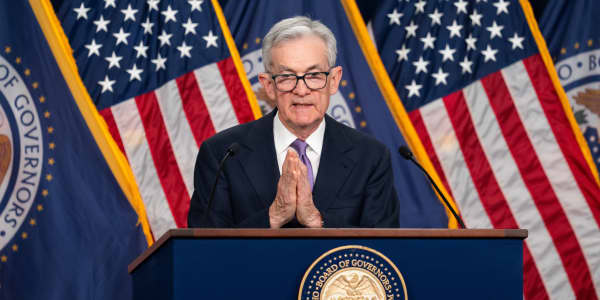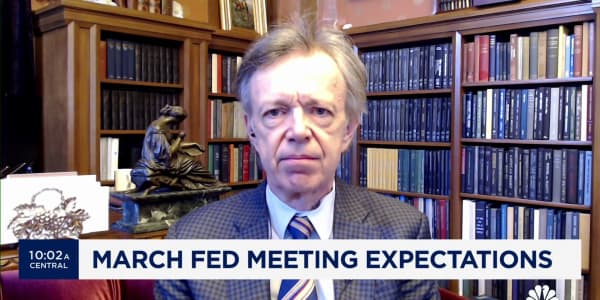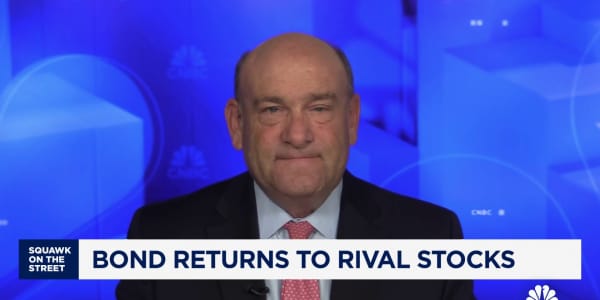Mirroring a sharp split on the Fed, market participants are divided over the direction of central bank policy with the October CNBC Fed Survey finding just under half expecting the Fed to launch another round of quantitative easing in the next year.
The 48 percent of market participants looking for more quantitative easing marks an increase from 34 percent in the September survey. By contrast, 46 percent of the 61 respondents say there will be no more QE, down from 59 percent in the last survey.
“The biggest surprise we will get in the next year is that the Fed will be forced to tighten its policy stance,’’ wrote Brian Wesbury of First Trust Advisors, who is among those not looking for new QE. “The economy is not on the brink of recession and inflation will become a serious and visible problem.”
But John Kattar of Eastern Investment Advisors, counters, “We may be in an environment late this year or early next year where most of the world's central banks are aggressively easing. This is potentially very positive for risk assets.”
Just 7 percent of those who expect the Fedto act believe it will do so at the two-day meeting that begins Tuesday, but 55 percent of the group see a new QE program announced by the January meeting. The average expected amount of a new QE program fell to $457 billion from $527 billion in September, and $628 billion in August.
Even while the percentage expecting more Fed easing has risen, respondents also see the economy improving. Participants dropped the chance of recession over the next 12 months to 26 percent from 36 percent in September, while they slightly raised their growth outlook for 2012 to 2.37 percent from 2.24 percent, the first increase in four months.
In other findings, survey respondents:
- See the S&P 500 rising to 1358 by June 2012, which marks an 8.3 percent gain from current levels and is up from the forecast of 1312 in the September survey.
- Gave the European plan a tentative and wary thumbs up, with 72 percent saying that the overall plan doesn’t go far enough but that Europe is on the right track. About a quarter said the plan falls short and Europe won’t be able to solve its problem.
- Are more likely to believe that Euro zone will break up in the next five years, with 52 percent saying some countries will be ejected or leave and 47 percent thinking it will remain intact.
- Graded Fed Chairman Ben Bernanke’s job performance with a B- compared with a C+ for the outgoing ECB President Jean Claude Trichet.
- Forecast that the yield on 10-year note will hit 2.8 percent by June, compared with the current level of 2.14 percent.
The divergence among market participants over the direction of Fed policy mirrors a split on the rate-setting Open Market Committee and could just as well be the result of contrasting public comments from officials.
In recent weeks, influential members such as New York Fed President Bill Dudley and Vice Chair Janet Yellen have offered that the Fed could do additional quantitative easing, while Chicago Fed President Charlie Evans has discussed changing Fed communications strategy to peg policy to actual economic benchmarks rather than a calendar date, as is currently case.
Just 36 percent of respondents back economic pegs for policy, with 57 percent saying the Fed should not alter its communications to peg policy to explicit economic numbers. Of those who support economic pegs, 86 percent back an inflation target, with the average target of the group put at 2.7 percent; 50 percent support a nominal GDP target, with an average of 5.5 percent; and 41 percent say the Fed should peg an unemployment rate, with the average of 6.5 percent.
“The Fed is still closer to the beginning than the end of a new era in its use of unconventional monetary policy tools,” wrote Diane Swonk of Mesirow Financial.
Chris Rupkey of Bank of Tokyo/Mitsubishi see additional mortgages purchases of $500 billion announced at the November meeting.
Comments on the European bailout plan were generally supportive, including those by David Kotok at Cumberland Advisors saying, “Europe does not have a death wish. That is why they will preserve both the Euro zone and the banking system.”
Lynn Reaser of Point Loma Nazarene University says, “Europe's problems are not over. Countries such as Greece, Portugal, and Italy need to address fundamental issues regarding their competitiveness and ability to grow. For now, however, Europe's sovereign debt issue may fade a little from the limelight while the U.S. debt issue and the proposals of the super committee capture the spotlight.”





